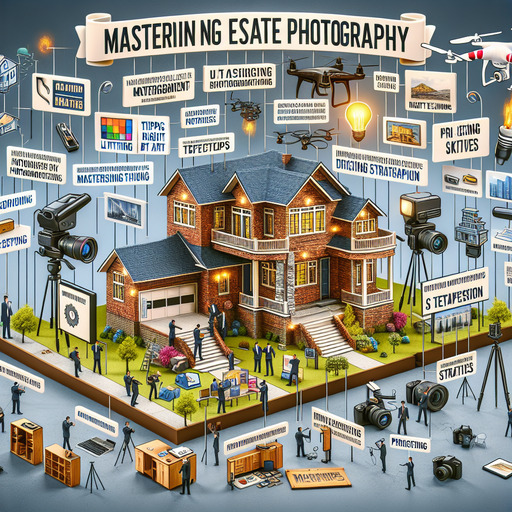
-
Table of Contents
- Mastering Real Estate Photography: Tips, Techniques, and Tools
- Understanding the Importance of Real Estate Photography
- The Impact of Quality Photos on Listings
- Essential Real Estate Photography Tips
- 1. Use the Right Equipment
- 2. Master the Art of Lighting
- 3. Perfect Your Composition
- Advanced Techniques: Drone Photography and Editing
- Real Estate Drone Photography
- Real Estate Photography Editing
- Pricing Your Real Estate Photography Services
- Conclusion
- Questions and Answers
- 1. What is the best time of day to take real estate photos?
- 2. How can I make small rooms look bigger in photos?
- 3. Is drone photography necessary for all real estate listings?
Mastering Real Estate Photography: Tips, Techniques, and Tools
In the competitive world of real estate, first impressions are everything. High-quality real estate photography can make or break a property listing, influencing potential buyers’ decisions before they even step foot inside. Whether you’re a seasoned photographer or a real estate agent looking to enhance your listings, understanding the nuances of real estate photography is crucial. This guide will walk you through essential tips, techniques, and tools to elevate your property photography game.
Understanding the Importance of Real Estate Photography
Real estate photography is more than just snapping pictures of a property. It’s about capturing the essence and potential of a space, enticing potential buyers to envision themselves living there. According to the National Association of Realtors, 87% of home buyers found photos to be the most useful feature when searching for a home online.
The Impact of Quality Photos on Listings
- Properties with high-quality images sell 32% faster than those with lower-quality visuals.
- Listings with professional photos receive 118% more online views.
Essential Real Estate Photography Tips
To capture stunning real estate photos, consider these practical tips:
1. Use the Right Equipment
Investing in the right real estate photography equipment can significantly impact the quality of your images. A DSLR camera with a wide-angle lens is ideal for capturing spacious interiors.
- Camera: A full-frame DSLR or mirrorless camera.
- Lens: A wide-angle lens (16-35mm) to capture more of the room.
- Tripod: Essential for stability and low-light conditions.
2. Master the Art of Lighting
Lighting can make or break a photo. Natural light is your best friend, so shoot during the day and open all curtains and blinds. For darker areas, consider using external flash or continuous lighting.
3. Perfect Your Composition
Composition is key in real estate photography. Use the rule of thirds to create balanced and engaging images. Ensure vertical lines are straight, and avoid clutter in your shots.
Advanced Techniques: Drone Photography and Editing
To stand out in the crowded real estate market, consider incorporating advanced techniques like drone photography and professional editing.
Real Estate Drone Photography
Drone photography offers a unique perspective, showcasing the property’s exterior and surrounding area. This technique is particularly effective for large estates or properties with stunning landscapes.
Real Estate Photography Editing
Editing is where good photos become great. Use software like Adobe Lightroom or Photoshop to enhance colors, correct distortions, and ensure consistency across your images.
Pricing Your Real Estate Photography Services
Determining real estate photography pricing can be challenging. Consider factors like the property’s size, location, and the complexity of the shoot. Research competitors in your area to ensure your rates are competitive yet profitable.
Conclusion
Mastering real estate photography requires a blend of technical skills, creativity, and the right equipment. By following these tips and techniques, you can create compelling images that captivate potential buyers and enhance your property listings.
For more insights into real estate photography, check out this Wikipedia page on real estate photography.
Questions and Answers
1. What is the best time of day to take real estate photos?
The best time to take real estate photos is during the day when natural light is abundant. Early morning or late afternoon provides soft, diffused lighting that enhances the property’s features.
2. How can I make small rooms look bigger in photos?
To make small rooms appear larger, use a wide-angle lens and shoot from a corner to capture more of the space. Keep the room tidy and decluttered to create an open feel.
3. Is drone photography necessary for all real estate listings?
Drone photography is not necessary for all listings but can be beneficial for properties with large exteriors or unique landscapes. It provides a comprehensive view that traditional photography cannot.
If you’re interested in learning more about our real estate photography services or have any questions, please contact us.